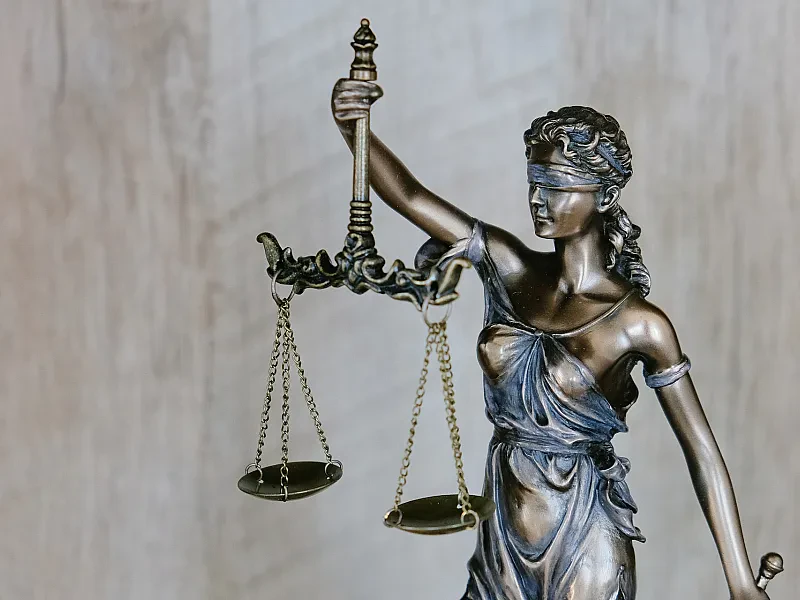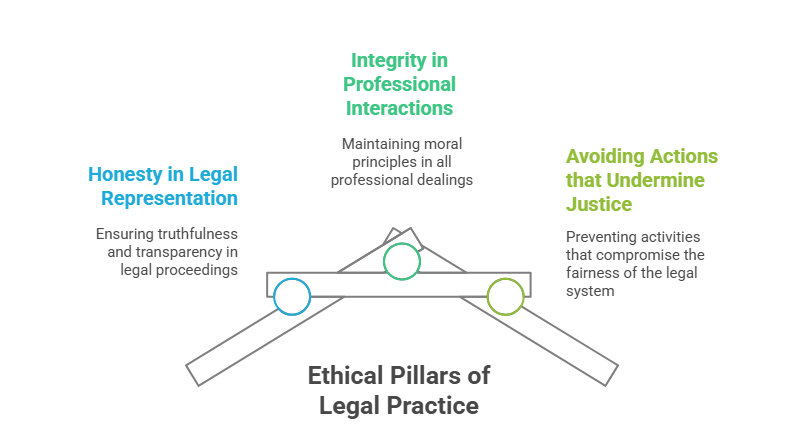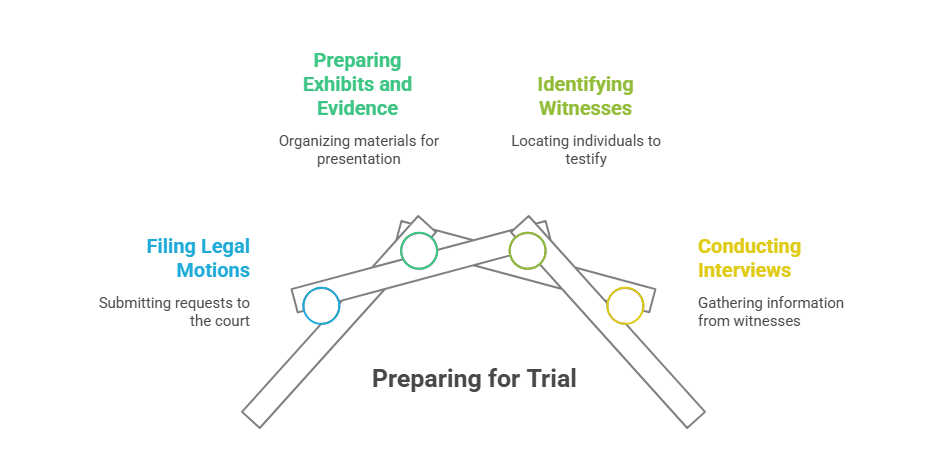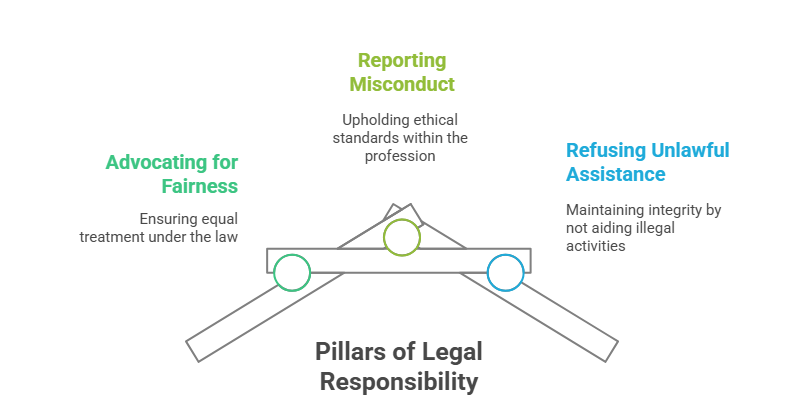
Table of Contents
Attorneys are essential pillars of justice, charged with safeguarding rights and guiding people and organizations through complex systems of laws. Whether standing before judges on behalf of their clients, brokering business agreements, or counseling clients regarding immigration issues, their efforts are firmly based in knowledge of the law, ethical responsibilities, and advocacy for clients.
This comprehensive guide delves into the core roles of lawyers across different fields of practice—documenting their professional responsibilities, client dealings, court process handling, and corporate compliance and governance functions.
Ethical and Moral Duties of a Lawyer
Core Ethical Standards in the Legal Profession
A lawyer's foremost duty is to uphold the rule of law and act ethically. This includes:

Bar councils and licensing bodies (e.g., American Bar Association, Bar Council of India, Law Society UK) have strict codes of professional conduct. Violating these codes can result in suspension or disbarment.
Conflict of Interest, Candor, and Confidentiality
Lawyers must:
- Avoid conflicts of interest by not representing opposing parties in the same matter
- Exercise candor—truthfulness to the court and clients
- Maintain strict confidentiality, even after the client-lawyer relationship ends
Attorney-Client Privilege
This privilege protects communications between lawyers and clients. Unless waived or overridden by law (e.g., in criminal investigations), lawyers cannot disclose sensitive information.
Responsibilities Toward Clients
Maintaining Communication and Trust
Clients depend on lawyers for honest advice, regular updates, and legal insight. This means:
- Informing clients of case progress
- Answering queries in a timely manner
- Clarifying complex legal terms and processes
Duty of Competence and Diligence
Lawyers must demonstrate:
- Legal competence—up-to-date knowledge of applicable laws
- Diligence—prompt and efficient handling of all tasks
- Zeal—advocating vigorously within legal boundaries
Failure in these duties may lead to malpractice claims.
Confidentiality and Conflict Management
Beyond legal obligation, confidentiality builds trust. Lawyers must not:
- Discuss client matters with third parties
- Represent clients with conflicting interests unless both consent
Proper conflict checks and consent documentation are essential.
Termination of Legal Representation
Lawyers may withdraw from a case if:
- The client engages in fraudulent conduct
- Fees remain unpaid after notice
- Continued representation violates law or ethics
However, withdrawal must not prejudice the client’s legal position.
Courtroom and Trial Responsibilities
Pre-trial Preparation and Motions
Before court proceedings begin, lawyers must:

Conduct During Trial
During trials, responsibilities include:
- Cross-examining witnesses
- Objecting to improper evidence
- Presenting facts and legal arguments clearly
- Respecting courtroom decorum and judicial authority
Trial lawyers must follow procedural rules and ethical guidelines in oral arguments and document submissions.
Appealing a Case
If a judgment is unfavorable, lawyers may:
- Advise on grounds for appeal
- Draft appellate briefs
- Present arguments before appellate courts
They must honestly inform clients of the risks and likely outcomes.
Specialized Legal Practice Responsibilities
Criminal Lawyer Responsibilities
Criminal defense attorneys must:
- Ensure fair trial rights for accused individuals
- Investigate evidence, challenge prosecution, and build defense strategies
- Negotiate plea deals or mitigate sentencing when appropriate
They must defend the client without endorsing illegal conduct.
Civil and Corporate Legal Duties
Civil lawyers handle disputes between individuals or organizations, including:
- Breach of contract
- Personal injury claims
- Employment law matters
Corporate lawyers assist with:
- Mergers and acquisitions
- Corporate governance compliance
- Drafting and reviewing contracts
- Managing legal risks for businesses
Immigration and Tax Law Responsibilities
Immigration lawyers navigate complex visa systems, asylum processes, and citizenship applications. Their duties include:
- Reviewing documents
- Filing petitions
- Representing clients before immigration tribunals
Tax attorneys assist individuals and companies with:
- Tax planning
- Responding to audits
- Resolving disputes with tax authorities
Family and Real Estate Legal Duties
Family lawyers address:
- Divorce and custody disputes
- Domestic violence protection orders
- Adoption and guardianship
Real estate lawyers handle:
- Property sales and title transfers
- Land disputes
- Lease agreements and compliance
In both cases, attention to legal detail and sensitive client communication are key.
Corporate and Compliance Responsibilities
Legal Risk Management
Corporate lawyers are often tasked with identifying potential legal risks in:
- Contracts
- Corporate operations
- Regulatory changes
They develop compliance protocols to prevent future litigation or penalties.
Corporate Governance Duties
Lawyers support boards and executives by:
- Reviewing corporate policies
- Ensuring compliance with fiduciary duties
- Advising on shareholder rights
AML, KYC, and Internal Policy Reviews
Anti-money laundering (AML) laws require firms to monitor transactions and client profiles. Lawyers assist by:
- Drafting KYC (Know Your Customer) guidelines
- Investigating suspicious financial activity
- Reporting compliance violations
Data Protection and Privacy Law
With rising global data regulations like GDPR and HIPAA, lawyers now:
- Review privacy policies
- Advise on cross-border data transfer laws
- Represent firms in data breach litigation
Lawyer Responsibilities to the Legal System
Upholding Justice and Rule of Law
Lawyers serve the legal system by:

This duty often overrides loyalty to clients in extreme cases.
Pro Bono and Public Interest Legal Work
Many legal institutions require lawyers to dedicate time to pro bono (free) services. This includes:
- Defending low-income clients
- Supporting NGOs and nonprofits
- Filing public interest litigations (PILs)
Professional Development and Continuing Education
To maintain licensure and competence, lawyers must:
- Complete Continuing Legal Education (CLE) hours
- Stay informed about law reform and landmark rulings
- Participate in professional organizations and bar events
Frequently Asked Questions (FAQs)
| Question | Answer |
|---|---|
| Do lawyers owe a duty of loyalty to clients? | Yes, loyalty and fiduciary trust are core legal and ethical duties. |
| What happens if a lawyer breaks confidentiality? | Disciplinary action, malpractice lawsuits, and potential disbarment. |
| Are all lawyers required to appear in court? | No. Some lawyers work exclusively in advisory, corporate, or research roles. |
| Can a lawyer decline a case? | Yes, particularly in cases of conflict of interest or lack of expertise. |
| What is the lawyer’s duty during cross-examination? | To test the reliability and credibility of a witness while staying ethical. |
| Is billing transparency a legal duty? | Yes. Lawyers must clearly disclose fee structures and billing details. |
| Do lawyers have obligations after terminating service? | Yes, including safeguarding client property and maintaining confidentiality. |
| What are lawyer duties in data protection? | Advising on compliance, handling sensitive data securely, and reporting breaches. |
Conclusion
The responsibilities of a lawyer extend far beyond courtroom battles. From ethical obligations and client confidentiality to corporate risk management and access to justice, the role demands precision, integrity, and empathy.
Understanding these responsibilities helps clients make informed decisions and empowers aspiring legal professionals to build careers based on principle and service.
If you’re seeking legal representation, choose a lawyer who not only understands the law—but respects the responsibilities that come with it.
Disclaimer: This article provides general information and should not be construed as legal advice. Please consult with a qualified and experienced lawyer for personalized guidance regarding your specific situation.
